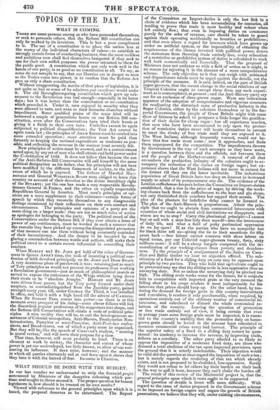TOPICS OF THE DAY.
WHAT IS COMING.
Tams are some persons among us who have persuaded themselves, or seek to persuade others, that the Reform Bill constitution can adz be worked by its inventors. This is but a poor compliment to it. The use of a constitution is to place the nation less at the mercy of the individual characters of rulers—to establish so strongly certain forms of conducting business, that the most reckless and ambitious men shall feel themselves hampered if they seek to toe for their own selfish purposes the _power intrusted to them for the public good. A constitution which can only work well in the hands of one party, is as good as no constitution at all. To say, as some do not scruple to say, that our liberties are in danger as soon as the Tories come into power, is to confess that the Reform Act gave us only a sham constitution. Without exaggerating the merits of that piece of legislation, it is not quite so bad as some of its admirers par excellence would make it. The old Boroughmongering constitution which grew up sub- sequent to the Revolution was bad enough—especially in its latter days; but it was better than the constitution or no-constitution which preceded it. Under it, men enjoyed in security what they Were allowed to earn, and went to their favourite churches without impediment. Some qualified praise of the same kind will be bestowed a couple of generations hence on our Reform Bill con- stitution, even after the Conservatives have tried their hands at giving it a finish to their own taste. Catholics cannot be again subjected to political disqualification ; the Test Act cannot be again made law ; the principles of ADAM Sams must be carried into more extended operation ; more attention must be paid than formerly to keeping the national expenditure as moderate as pos- sible, and collecting the revenue in the manner least severely felt. New principles of action must be avowed, and to a certain extent acted upon, by any set of men who shall obtain and hold power under the Constitution of 1832. It does not follow that because the son of the Anti-Reform-Bill Conservative will call himself by the same political designation as his father, that his principles will not have been modified by the different framework of society, to the influ- ences of which he is exposed. The fathers of Marshal MAC- DONALD and General WINGFIELD Scorr were obliged to leave this country on account of their devotion to the divine hereditary right of the errumers; yet the one has made a very respectable Revolu- tionary General in France, and the other an equally respectable Republican General in America. Most men's principles or opi- nions are a mere supplement to their existence—certain forms of speech by which they reconcile themselves to any disagreeable feelings occasioned by their reflections on their own conduct and circumstances. The principles and opinions of a party are the same thing on a larger scale: they are not so much rules of action as apologies for belonging to the party. The political creed of the Conservatives under the Reform Bill, if they ever obtain a lease of power of any continuance, must be worded in such a manner that the recruits they have picked up among the disappointed promoters of that measure can use them without being constantly reminded of their inconsistency. And the danger to be incurred by too glaring a contradiction between words and actions, will make their political creed to a certain extent influential in controlling their conduct.
When HARLEY and ST. Josue got hold of the reins of Govern- ment in Queen ANNE'S time, the task of inventing a political con- fession of faith devolved principally on ST. Jona and Dean Swirl. A very dexterous piece of patchwork it was ; retaining just as much of Tory principles as would not prevent its professors from working a Revolution government—just as much of philosophical morals as served to expose the rottenness of the Whigs without tying down their rivals to be " absolute Josephs." HARLEY and ST. JOHN were driven from power, but the Tory party formed under their auspices, as contradistinguished from the Jacobite party, gained strength every year, till, under GEORGE the Third, it was installed in office, and held it with a high hand till the advent of CANNING. When Sir ROBERT PEEL comes into power—as there is at this moment every prospect of his doing—some clever fellows will lick the discordant popular professions of his supporters into shape, and the Reform-Bill Conservatives will obtain a code of political prin- ciples. A nice medley they will be, to snit the heterogeneous as- sortment of Colonial monopolists, Anti-Slavers, Presbyterian Non- intrusionists, Puseyites or semi-Puseyites, Anti-Poor-law enthu- siasts, and Bread-taxers, out of which a party must be organized. But they will be, like the speech of CHAUCER'S student, " souning in moral vertue," and will serve their purpose for a titer.
That time, however, will most probably be brief. There is an element at work in society, the character and extent of whose power is yet too undeveloped, too little known, to allow of our esti- mating its influence. It does exist, however ; and the manner in which all parties alternately rail at and fawn upon it shows that they hate it with the hatred of fear. Its name is Chartism.


























 Previous page
Previous page